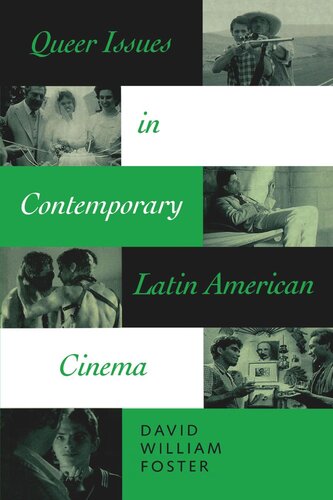

Most ebook files are in PDF format, so you can easily read them using various software such as Foxit Reader or directly on the Google Chrome browser.
Some ebook files are released by publishers in other formats such as .awz, .mobi, .epub, .fb2, etc. You may need to install specific software to read these formats on mobile/PC, such as Calibre.
Please read the tutorial at this link: https://ebookbell.com/faq
We offer FREE conversion to the popular formats you request; however, this may take some time. Therefore, right after payment, please email us, and we will try to provide the service as quickly as possible.
For some exceptional file formats or broken links (if any), please refrain from opening any disputes. Instead, email us first, and we will try to assist within a maximum of 6 hours.
EbookBell Team

4.7
26 reviewsViewing contemporary Latin American films through the lens of queer studies reveals that many filmmakers are exploring issues of gender identity and sexual difference, as well as the homophobia that attempts to defeat any challenge to the heterosexual norms of patriarchal culture. In this study of queer issues in Latin American cinema, David William Foster offers highly perceptive queer readings of fourteen key films to demonstrate how these cultural products promote the principles of an antiheterosexist stance while they simultaneously disclose how homophobia enforces the norms of heterosexuality. Foster examines each film in terms of the ideology of its narrative discourse, whether homoerotic desire or a critique of patriarchal heterosexism and its implications for Latin American social life and human rights. His analyses underscore the difficulties involved in constructing a coherent and convincing treatment of the complex issues involved in critiquing the patriarchy from perspectives associated with queer studies. The book will be essential reading for everyone working in queer studies and film studies. The films discussed in this book are: De eso no se habla (I Don't Want to Talk about It) El lugar sin límites (The Place without Limits) Aqueles dois (Those Two) Convivencia (Living Together) Conducta impropia (Improper Conduct) The Disappearance of García Lorca La Virgen de los Sicarios (Our Lady of the Assassins) Doña Herlinda y su hijo (Doña Herlinda and Her Son) No se lo digas a nadie (Don't Tell Anyone) En el paraíso no existe el dolor (There Is No Suffering in Paradise) A intrusa (The Interloper) Plata quemada (Burnt Money) Afrodita (Aphrodite) Fresa y chocolate (Strawberry and Chocolate)